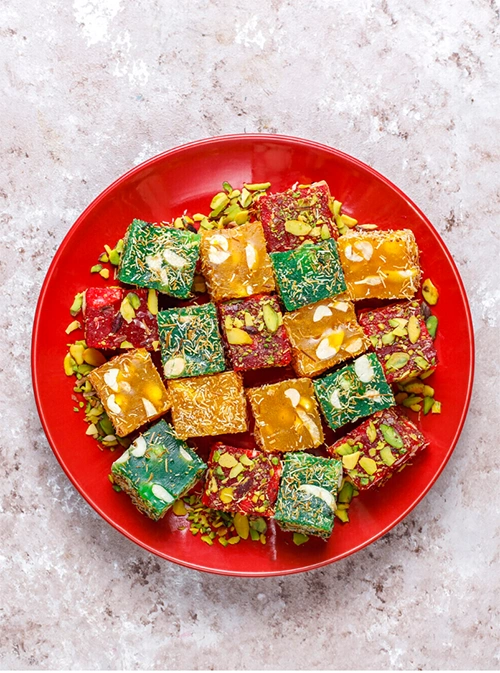

Top Health Benefits of Turkish Lokum You Need to Know
Turkish Delight, or Lokum, is a sweet treat primarily composed of sugar and starch, providing a quick and concentrated source of energy. While it is not particularly rich in vitamins or minerals, it can offer a small amount of dietary fiber and healthy fats when made with nuts like pistachios or almonds. These nuts also contribute plant-based protein and essential nutrients such as vitamin E, magnesium, and antioxidants. When prepared with natural flavorings like rose water, lemon, or pomegranate, it may also provide trace phytochemicals. However, due to its high sugar content, Turkish Delight should be enjoyed in moderation, particularly for those monitoring blood sugar levels or managing calorie intake. In festive settings or as a cultural dessert, it can serve as a delightful and satisfying way to end a meal.
Recipe :
For 4 people
Enjoy your homemade Turkish Delight – soft, chewy, and bursting with flavor!
Making authentic Turkish Delight requires patience, precision, and continuous attention during the cooking process. One of the most crucial steps is achieving the correct consistency — the mixture must be stirred constantly over low to medium heat until it transforms from a cloudy paste into a glossy, elastic mass. This can take up to 45 minutes or more. Accurate measurement of ingredients, especially sugar and starch, is essential to achieve the right texture — too much starch can make it rubbery, while too little can cause it to remain sticky. Temperature control is also vital; overheating can caramelize the sugar, ruining the flavor and color. It is equally important to let the mixture set properly for several hours or overnight to ensure it firms up before cutting. Coating the finished cubes in powdered sugar or coconut not only prevents sticking but also adds a finishing touch of flavor and texture. Clean, dry utensils and a non-stick surface are highly recommended for an easier and more successful result.

Turkish Delight can fit into certain dietary lifestyles, but it is not universally appropriate. It is suitable for vegetarian and vegan diets (when no gelatin or animal-derived stabilizers are used), and it can also be gluten-free if made with cornstarch or other gluten-free starches instead of wheat flour. However, due to its high sugar content, it is not recommended for ketogenic, paleo, low-calorie, or diabetic-friendly diets, as it causes rapid spikes in blood sugar and insulin. It is also low in protein and healthy fats, making it unsuitable for high-protein diets. People following the Mediterranean or DASH diets, which emphasize whole grains, vegetables, lean proteins, and limited added sugars, should also avoid regular consumption. While it can be enjoyed occasionally in small portions, those on restricted eating plans should be cautious and always check the ingredient list for additives or allergens such as nuts, artificial colors, or gluten-containing thickeners.
...